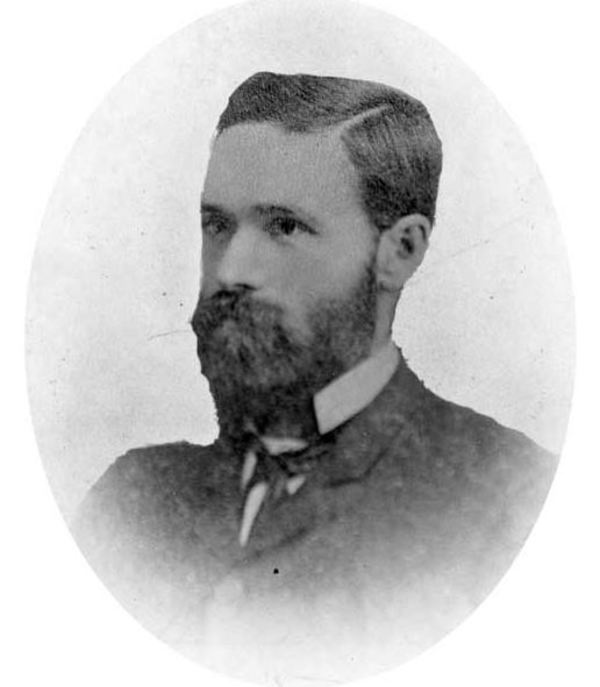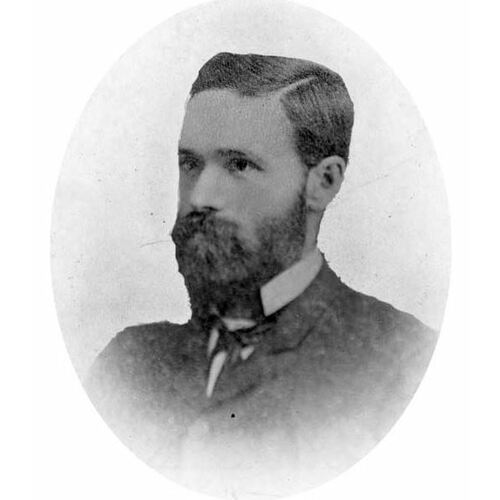
Source: Link
BROWN, CORYDON PARTLOW, school administrator, surveyor, businessman, and politician; b. 15 Nov. 1848 in Southampton, N.B., son of William Brown; m. first 21 Feb. 1874 Emma Davidson of Palestine (Gladstone), Man.; m. secondly 1885 Jennie Davidson, his first wife’s younger sister; he had six children; d. 17 Dec. 1891 in Winnipeg.
Corydon Partlow Brown was educated in Southampton, and later in Fredericton, where he received his training as a civil engineer. After spending most of 1872 as principal of St Mary’s School, he moved west to work on contract as a land surveyor for the dominion lands branch. In 1873 he took up two quarter sections of land in what was to become the district of Westbourne, Man.
Brown became the archetypal businessman-politician, serving as a “booster” for the interests of his district, and his province, while simultaneously serving his own ends. In 1873 he opened the first store in the area, and followed with a sawmill, a grist-mill, and a newspaper, the Gladstone News and Westbourne County Farmer, founded in 1879. He served both as a promoter and as the managing director in 1881–82 of the Portage, Westbourne and North Western Railway, which linked the district to outside markets. In 1882 he was a partner in Bailey, Lochart and Brown, Westbourne’s first bankers. In fact, Gladstone, the area’s major town, was located primarily on his land, largely because of his role as surveyor of the town-site in 1875.
Elected in 1874 to represent Westbourne in the Legislative Assembly, Brown made his mark by introducing a series of bills which laid the foundation for the organization of new settlements into municipalities. Although he had run as an independent Liberal in opposition to French language rights and the dual public school system, he gradually altered his position and associated himself with John Norquay*, a leading English-speaking moderate. This shift, when added to Brown’s strong legislative record, his service on the Board of Education of Manitoba from 1875 to 1877, and his growing ties with the Winnipeg business community, made him a natural choice for a cabinet position when Norquay became premier in 1878.
As provincial secretary from 16 Oct. 1878 to 19 Nov. 1879 and minister of public works from 19 Nov. 1879 to 27 Aug. 1886, Brown was involved in every aspect of Manitoba’s political development. While Norquay was in the limelight arguing for “better terms,” for boundary extensions, and, eventually, for an end to the federal government’s disallowance of railway charters, Brown moved quietly behind the scenes attempting to explain Manitoba’s desperate situation to Prime Minister Sir John A. Macdonald. As minister of public works, Brown was in charge of the construction of roads and of land drainage programs, the latter particularly crucial after the dominion granted Manitoba control over its swamplands in 1881. He presided over a number of ditching and river diversion schemes designed to reclaim these marshes for agricultural use.
Despite his competence, by the mid 1880s Brown was being attacked in the Liberal press as a “boodle politician” who was lavish in his granting of public lands. Such attacks were to be expected, however, as the old system of coalition governments gave way to the openly partisan approach of Thomas Greenway*’s Liberal party and William Fisher Luxton*’s Daily Free Press. Ironically, even as Brown was being roasted in the press for his role in Norquay’s administration, he himself was falling out of favour with the premier and the provincial treasurer, Alphonse-Alfred-Clément La Rivière*. On 27 Aug. 1886 Brown was demoted to provincial secretary and on 11 March 1887 he resigned from the cabinet, apparently over the method of granting government contracts advocated by La Rivière and Norquay which he judged improper. When a railway scandal led to the fall of Norquay’s government in December 1887, prominent Conservatives such as William Bain Scarth* and Charles Acton Burrows feared that Brown, whose loyalty to the party had become suspect, might help Greenway form a cabinet. Although this did not occur, Brown’s career as a Conservative politician had ended. After having been re-elected by acclamation in 1878, 1879, and 1883, and having won a hard-fought election in 1886, he could not even win the Conservative nomination for Westbourne in 1888.
Somewhat embittered, Brown returned to land surveying, but received only a trickle of work from the Conservative government in Ottawa. He also engaged in a number of business projects, including the promotion of a new southeastern railway and the development of a steam-driven plough. He attempted to restore his stock with the Conservative party but, before that could be achieved, he was stricken with pneumonia and, after a brief illness, died at the age of 43.
Man., Legislative Library (Winnipeg), Vert. file, Gladstone. NA, MG 26, A, 119–485; MG 27, I, E19 (mfm.). Gladstone Age and Westbourne County Advertiser (Gladstone, Man.), May 1883–January 1890. Daily Free Press (Winnipeg), September 1874–December 1891. Le Manitoba (Winnipeg), 23 déc. 1891. Manitoba Sun (Winnipeg), 24 Dec. 1883. CPC, 1874–88. Pioneers of Man. (Morley et al.). Margaret Morton Fahrni and W. L. Morton, Third crossing; a history of the first quarter century of the town and district of Gladstone in the province of Manitoba (Winnipeg, 1946). Morton, Manitoba (1967). Winnipeg Tribune, 28 June 1930.
Cite This Article
J. Mochoruk, “BROWN, CORYDON PARTLOW,” in Dictionary of Canadian Biography, vol. 12, University of Toronto/Université Laval, 2003–, accessed December 31, 2025, https://www.biographi.ca/en/bio/brown_corydon_partlow_12E.html.
The citation above shows the format for footnotes and endnotes according to the Chicago manual of style (16th edition). Information to be used in other citation formats:
| Permalink: | https://www.biographi.ca/en/bio/brown_corydon_partlow_12E.html |
| Author of Article: | J. Mochoruk |
| Title of Article: | BROWN, CORYDON PARTLOW |
| Publication Name: | Dictionary of Canadian Biography, vol. 12 |
| Publisher: | University of Toronto/Université Laval |
| Year of publication: | 1990 |
| Year of revision: | 1990 |
| Access Date: | December 31, 2025 |



